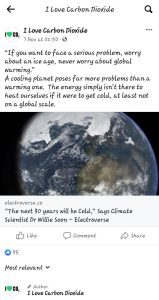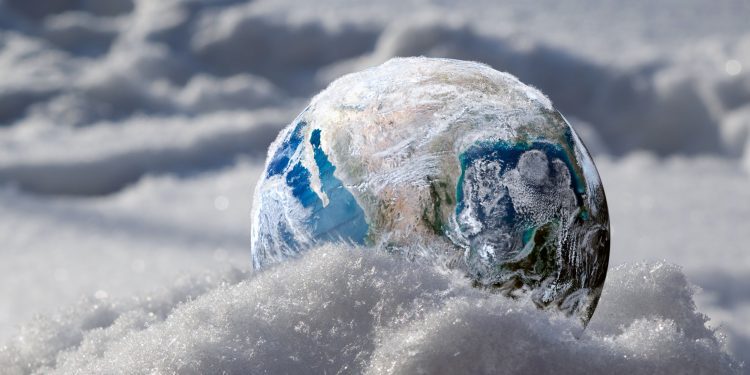An article published on Electroverse has claimed that the ‘Next 30 years will be cold.’
The article which is a highlight of a paper presented by Skeptical Climate Scientist, Dr. Willie Soon read in part that “we are already in a very weak activity state, weaker than the active state of the 1980s/90s. This reduced spell of activity we’re in now started in 2008 and is expected to last until 2050.
“The next 3 decades will be “a very interesting time to be living because we have another 30 years of the possibility of cooling.
“What we predict is that the next 20-30 years will be cold,” says Dr. Willie Soon.
Sharing the article via a Facebook post, a Page named ‘I Love Carbon Dioxide’, with over 20,000 likes stated that global warming is not a threat that humans should worry about because a cooling planet is more dangerous.
The Facebook post quoted a part of the article and shared that “If you want to face a serious problem, worry about an ice age, never worry about global warming. A cooling planet poses far more problems than a warming one. The energy simply isn’t there to heat ourselves if it were to get cold, at least, not on a global scale.”

A cooling Planet (the Ice Age)
According to Science Focus, the Ice Age, otherwise known as a glacial period, refers to the cooling climate change that periodically freezes Earth, and it has gripped the Earth for most of the last 2.6 million years.
Britannica also defines the Ice age as a geologic period during which thick ice sheets cover vast areas of land. Such periods of large-scale glaciation may last several million years and drastically reshape surface features of entire continents.
“A number of major ice ages have occurred throughout Earth’s history. The earliest known took place during Precambrian time dating back more than 570 million years. The most recent periods of widespread glaciation occurred during the Pleistocene Epoch (2.6 million to 11,700 years ago)”, Britannica shared.
Simplified by study.com, an ice age is a prolonged period of time where cold weather and large glaciers cover most of the earth, and when these glaciers melt they can cause major changes to the environment.
Dangers of Global Warming
Global warming is the unusually rapid increase in Earth’s average surface temperature over the past century primarily due to the greenhouse gases released by people burning fossil fuels.
The impact of global warming is far greater than just increasing temperatures. NASA’s Earth Observatory says “warming modifies rainfall patterns, amplifies coastal erosion, lengthens the growing season in some regions, melts ice caps and glaciers, and alters the ranges of some infectious diseases. Some of these changes are already occurring.”
The UN also noted that Global warming can result in many serious alterations to the environment, eventually impacting human health and that it can also cause a rise in sea level, leading to the loss of coastal land, a change in precipitation patterns, increased risks of droughts and floods, and threats to biodiversity.
The dangers of climate change, according to the NDRC is evident in the increasing number of droughts, intense storms, and floods happening across the globe, which is posing risks to public health and safety.
When is the next Ice Age?
Recent research quoted by Carbon Brief confirms that the impact of humans on the planet is pushing back when the Earth might descend into its next ice age.
In the article written by Robert McSweeny, Carbon Brief says “while the Earth might have naturally cycled back into an ice age in 50,000 years’ time in the absence of emissions, we’re unlikely to see one for at least 100,000 years because of the CO2 we put into the atmosphere.”
Also, NASA’s Earth Observatory shared that as the world consumes ever more fossil fuel, greenhouse gas concentrations will continue to rise, and Earth’s average surface temperature will rise with them.
It noted further that “based on plausible emission scenarios, average surface temperatures could rise between 2°C and 6°C by the end of the 21st century. Some of this warming will occur even if future greenhouse gas emissions are reduced because the Earth system has not yet fully adjusted to environmental changes already made.”
As NASA debunked that the Earth is not cooling, it emphasised that “as countries around the world rapidly develop and gross domestic products increase, human-produced emissions of carbon dioxide are accelerating.”
Sharing his expert opinion, Philip Jakpor, an environment and climate activist, in an interview with BONews Service said it is evident that the earth is not returning to an ice age soon because of human activities and increased CO2 emissions into the atmosphere.
Jakpor said, “with the level of emissions that we have and the fossil fuel industry still expanding operations, especially in Africa, where we have oil and gas prospecting in about 45 countries out of which 18 are frontiers countries that have little or nothing to do with oil, the likelihood of nuclear winter or the earth cooling anytime soon does not arise.”
Verdict
The claim the ice age will return in 30 years is FALSE. The claim is misleading and could cause humans to continue to contribute to global warming, which is extremely dangerous to humans and the planet as a whole.
This fact-check was produced by BONews Service with support from Code for Africa’s PesaCheck, International Fact-Checking Network, and African Fact-Checking Alliance network.

